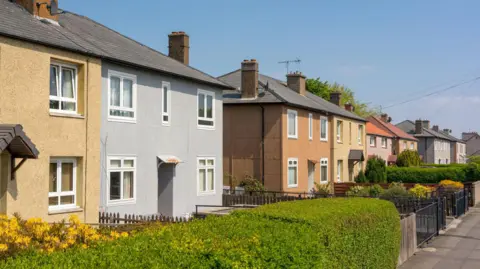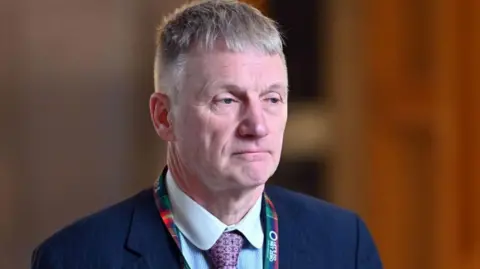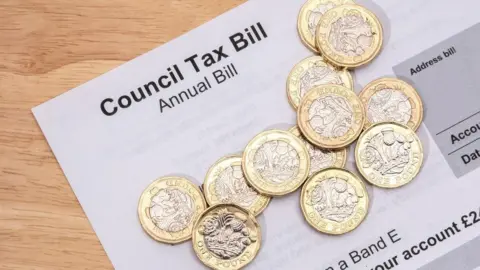Council tax revaluation 'absolutely' needed, says minister
 Getty Images
Getty ImagesA revaluation of Scotland's council tax bands is "absolutely needed", the public finance minister has said.
Ivan McKee told BBC Scotland News that plans were being worked on - and there would "be winners and losers".
Today's council tax bands are based on property values of 1991, when the average house price was about a quarter of its current level.
Following the minister's comments, the Scottish government said it would not hold a revaluation and current discussions were intended only to "inform public debate".
Replacing the council tax has long been an SNP ambition. The party's 2007 manifesto said the "unfair" tax should be scrapped for a local income tax.
In 2014, former First Minister Nicola Sturgeon set up a commission to look at alternatives.
The Scottish government has held ongoing talks with local government body Cosla, but revaluation had been seen as too politically painful to impose.
It would put some homes into more expensive bands, while others could see cuts in council tax bills.
 Getty Images
Getty ImagesMcKee told BBC Radio's Good Morning Scotland programme it was "important to get a political consensus" at Holyrood.
The public finance minister said: "There's absolutely a need for revaluation, and plans for that are being worked on just now.
"That creates a lot of issues if people are changing the value of their property significantly in a very short period of time.
"That's going to impact how you do the transition."
McKee said ministers were working on the details with Cosla.
He added: "The really important thing is that there is a consensus on this and we move forward in a way that everybody's signed up to.
"The reality of that is that there will be winners and losers, and that's really important to recognise."
 Getty Images
Getty ImagesFollowing McKee's radio interview, the Scottish government confirmed it had no immediate plans for revaluation to go-ahead.
A spokesperson said: "Ministers believe any suggestion of a revaluation could only proceed if a broad political consensus in favour existed.
"They do not believe that consensus currently exists."
"Any changes to Council Tax must also be informed by robust evidence and wide public consultation."
The Scottish government said discussions with Cosla would run "for a number of years".
A spokesperson added: "Ministers believe any plan for substantial reform thereafter, including any suggestion of revaluation, would require a mandate from a Scottish Parliament election and that this will not be possible this decade."

Council tax is based on the estimated value of your home 34 years ago.
If prices of all homes had risen at the same rate, then it would still work as a way of allocating homes into council tax bands.
The catch is that people's homes have changed in value relative to each other.
Some neighbourhoods have seen prices rise much more steeply than others – for instance those that used to be more down-at-heel but now attract buyers from far and wide. It's sometimes called "gentrification".
Where house prices have risen fastest, homes are likely to see a move up council bandings, so bills will go up. Where home valuations have not risen as steeply as the average, they could move down council bands.
How much difference could this make? Unlike Scotland and England, Wales had a council tax revaluation in 2003. One in three homes moved up a band, and one in 12 homes moved down. Some moved by two bands.
The experience was a painful one for the Welsh government, and it's avoided a further revaluation in the past 20 years.
As Ivan McKee says, we have to recognise there will be winners and losers. But those who win tend to give ministers less thanks than the grief they get from the people that lose out.

McKee's comments came after the Scottish Fiscal Commission published an update to its economic forecasts on Wednesday.
Among the documents published was a "meaningful and long-term" reform of council tax.
The financial sustainability plan was made up of three areas:
- Public spending
- Economic growth
- Taxation
The Scottish Government said it aims to reduce the public sector workforce by 0.5% each year for the rest of the decade.
Finance Secretary Shona Robison said taking no action would result in a £4.7bn budget black hole by 2030.
If left untreated, Robison told MSPs the gap between funding and day-to-day spending would top £2.6bn, while the capital deficit would grow to £2.1bn.
The strategy was published in the final week of the Scottish Parliament's 2024/25 session.
MSPs return to Holyrood in September, nine months out from the parliament's election on 7 May, 2026
